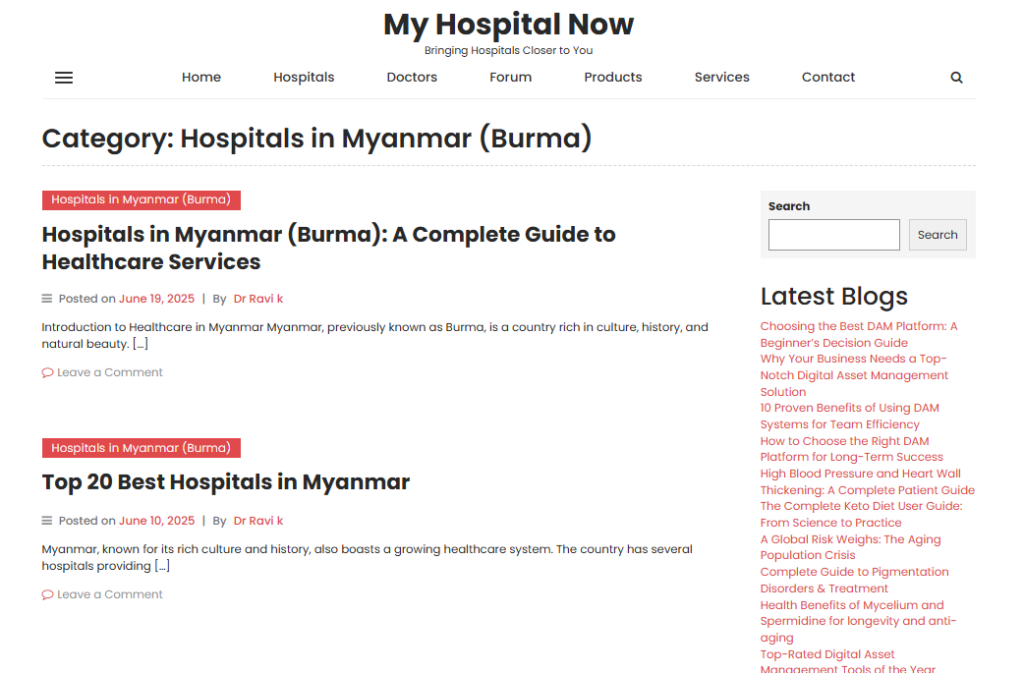
Myanmar, also known as Burma, is a nation in transition—politically, socially, and medically. While challenges continue, especially in some remote and conflict-affected regions, the country’s hospitals provide life-saving care through a growing mix of public and private options. In major cities, rapid modernization, new specialties, and international partnerships mean greater access to advanced surgeries, diagnostics, and specialist services for residents, expats, and travelers alike. Whether you need urgent surgery, trauma support, or routine checkups, MyHospitalNow offers you a reliable resource to explore updated hospital directories, detailed insights, and trusted decision support:
Understanding Healthcare in Myanmar
Myanmar’s healthcare landscape is broad and evolving:
- Public hospitals: Managed by the Ministry of Health, these offer inpatient and outpatient care, emergency services, surgery, maternity, and pediatrics, with university hospitals leading in technology and professional development.
- Private hospitals and clinics: Especially growing in Yangon and Mandalay, these bring modern amenities, English-speaking staff, faster access to elective surgery, and a focus on specialties like cardiology, oncology, orthopedics, and fertility.
- Regional and rural care: Rural health centers and township hospitals remain essential for primary and emergency care, with outreach by NGOs and faith-based clinics especially vital in underserved areas.
- Medical education and training: The country’s medical universities and increasing international cooperation are boosting skills among clinicians and surgeons.
- International partnerships & modernization: Through continuous investment, Myanmar is expanding programs for disease prevention, chronic care, digital diagnostics, and infection control—benefiting both citizens and international patients.
Why Patients Choose Hospitals in Myanmar
- A robust selection of specialties: surgery, trauma, maternity, cancer, heart disease, and infectious illnesses
- Modern, well-equipped hospitals in urban areas, with new diagnostic tools and ICUs
- Affordable, transparent pricing for both residents and travelers—much lower than in many Asian countries
- A growing network of private hospitals and clinics with English-speaking teams and clear communication
- Multilingual and culturally sensitive care, making Myanmar more welcoming for expats and travelers
- Community health programs, telemedicine, and outreach serving even remote regions via mobile health teams
Leading Hospitals and Clinics in Myanmar
Notable centers and facilities include:
- Yangon General Hospital: The nation’s historic public flagship for trauma care, complex surgery, and critical care.
- Mandalay General Hospital: A top referral center for upper Myanmar, offering surgery, pediatrics, oncology, and emergency medicine.
- North Okkalapa General Hospital (Yangon): Advanced neurology, emergency, and diagnostics.
- Yangon Specialty Hospital, Pun Hlaing Siloam Hospital (Private): Leaders in cardiac surgery, oncology, maternity, luxury comfort, and expatriate care.
- Asia Royal Hospital (Private, Yangon): Cosmetic and reconstructive surgery, emergency care, ICU, diagnostics.
- Parami General Hospital (Private, Yangon): Renowned for orthopedics, trauma, and minimally-invasive surgery.
- Specialized clinics and private medical centers (Yangon, Mandalay): Elective surgery, fertility services, dental care, and outpatient rehabilitation—with growing popularity among expats, business travelers, and returning diaspora.
View a current directory at Hospitals in Myanmar (Burma).
Myanmar’s Healthcare in Depth: Access & Challenges
- While core urban hospitals offer modern treatments and cutting-edge surgeries, humanitarian disruptions and environmental disasters sometimes limit access in remote areas.
- NGOs, humanitarian missions, and mobile medical teams provide vital immunizations, epidemic response, maternity care, and health education for millions, especially those in conflict-affected or hard-to-reach states.
- Myanmar’s health workforce is continually expanding its training and tech skills, partnering globally to strengthen emergency preparedness and care standards.
Surgeries & Treatments Available in Myanmar
- General, trauma, and emergency surgery (hernia repair, appendectomy, fracture repair, trauma resuscitation)
- Advanced cardiac/vascular care: angioplasty, bypass, valve procedures, post-operative rehabilitation
- Cancer treatments: diagnostics, chemotherapy, radiotherapy, and major surgical removal of tumors
- Orthopedics: joint replacements, pediatric trauma, complex bone surgery, sports medicine
- Maternity & fertility: high-risk pregnancies, IVF, C-sections, neonatal intensive care
- Pediatrics: congenital and childhood surgery, advanced neonatal care, vaccine programs
- Infectious disease/Tropical medicine: TB, malaria, HIV/AIDS, dengue, hepatitis
- Digestive and liver treatments, GI endoscopy, and chronic disease care
- Cosmetic/dental surgery: restorative, facial/body surgery, dental implants, smile design
- Critical care/ICU, ventilator support, and modern diagnostic imaging (MRI/CT/labs)
How to Choose the Best Hospital
- Match your need—routine, emergency, or specialist care—to hospitals and clinics listed on MyHospitalNow.
- Compare expertise, certifications, and service reputation—rely on online directories, patient reviews, and hospital profiles.
- Check for language support and patient services—choose hospitals with established international or expat coordination teams.
- **Ensure transparency—**on price, treatment planning, aftercare, insurance acceptance, and telemedicine availability.
- Seek aftercare/support—make sure the facility provides clear post-surgery and rehabilitation information.
Frequently Asked Questions
Q: Are Myanmar’s hospitals safe and modern?
A: Major urban hospitals and leading private clinics offer modern, patient-focused care. Outside cities, care access depends more on outreach, aid, and travel.
Q: Can expats and travelers get top-notch care?
A: Yes—especially in Yangon and Mandalay, where modern hospitals provide English- and multilingual support, and cater to international standards.
Q: Which specialties are best developed?
A: Trauma, general surgery, orthopedics, heart, maternity, cancer, cosmetic, and infectious diseases are strengths.
Q: How affordable is private or international hospital care in Myanmar?
A: Costs are regionally competitive; public care is subsidized, while private hospitals offer clarity in billing for global patients.
Conclusion
Myanmar’s hospitals are evolving—blending tradition, innovation, and compassionate care at every level. Modern city hospitals support advanced surgery, chronic disease management, and emergency services to locals, expats, and medical tourists. Even in challenging times, collaboration between the public system, private sector, NGOs, and communities creates a resilient, responsive network. For confident decisions and current information, rely on MyHospitalNow: